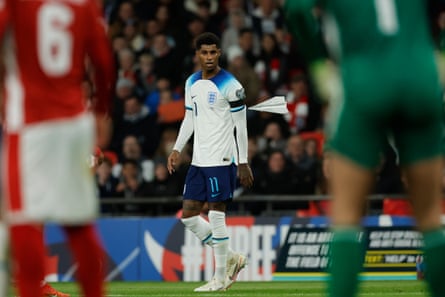Eight months ago, Italy and England faced off in a match. Under pressure near the left touchline, Harry Maguire attempted to make a forward pass using his weaker foot. However, Italy regained possession and took advantage of the chaos that ensued. Mateo Retegui found space behind Maguire and Luke Shaw, who would eventually receive a red card, and scored.
In the September match between Ukraine and England, it appeared to be Ben Chilwell’s mistake, but upon closer examination, it was not entirely his fault. James Maddison failed to provide support, leaving Chilwell isolated and Ukraine with a two-on-one advantage on their right side. Yukhym Konoplya then crossed the ball, resulting in a goal by Oleksandr Zinchenko.
A few days after Scotland’s match against England, there is a change in positions. Kieran Trippier, who typically plays on the right, is now playing as left-back. Meanwhile, Andrew Robertson, who is usually on the left, has the ball on the right side of the field. Unexpectedly, Robertson makes a move around the outside, using his weaker foot, and crosses the ball, leading to Maguire accidentally scoring an own goal.
Last month, England and Australia faced off in a soccer match. England’s team had a new player, Levi Colwill, playing as a left-back. During the game, Australia launched a counter-attack and moved the ball towards their right side. Colwill, without much help from his teammates, didn’t press Martin Boyle and let him send in a cross to Mitchell Duke. Unfortunately, Duke was unable to convert what could have been a great opportunity for Australia.
A few days after the match between England and Italy, Trippier is back in action. He continues to deceive the opposing wingers by appearing to move inside, showcasing his clever tactics. This time, Domenico Berardi takes advantage of Trippier’s positioning on his preferred right side, allowing him to miss Giovanni di Lorenzo’s sneaky run behind him. Berardi manages to pass the ball to Di Lorenzo, who then assists Gianluca Scamacca in scoring a goal.
On Friday night, the game shifted to Malta with only 20 seconds remaining. As soon as they gained possession of the ball, Malta immediately directed it towards England’s left-back area, where Fikayo Tomori, who is not typically a left-back, had a stroke of luck this time. Malta successfully gained control of the ball and made a quick move towards the goal. Teddy Teuma’s powerful shot just missed by inches, and on the 30th anniversary of conceding a goal to San Marino in just eight seconds, England narrowly avoided another potential humiliating defeat against a smaller international team.
This has become a concern as most of the big chances and goals conceded by England since the last World Cup have originated from their left side. Following England’s 2-0 win, Gareth Southgate tried to alleviate some of the pressure on Tomori’s performance, as he was playing in a position that is not his usual role at club level. Southgate mentioned that players like Fikayo have been asked to fill in unfamiliar positions and it is not easy for them to adapt. Availability issues in that area have also led to players being given a break.
Unfortunately, Southgate has faced misfortune in that specific area of the field. Luke Shaw has been absent for nearly three months due to an unspecified “muscle injury”, and Chilwell’s ongoing struggles with his hamstring have kept him sidelined since late September. It may be tempting to believe that once both players are back to full fitness, England’s issues will disappear. However, solely concentrating on individual players overlooks the larger problem at hand – regardless of who is on the left, England appears less confident defending that side.

To gain insight, let us examine the contrasting side of the field. In recent months, Southgate has consistently utilized Kyle Walker and Phil Foden as his preferred right-wing duo. These two have been long-time teammates at their club, and their strengths complement each other. Walker has a strong left foot while Foden favors his right, allowing for effective pressing and quick recovery pace. They also have the ability to switch positions, with Walker drifting inside and Foden showcasing his skills while overlapping. Most importantly, their partnership has flourished over time, which was evident in England’s improved offensive performance against Malta when Walker was substituted in for Trippier at right-back.
Ignore the advertisement for the newsletter.
after newsletter promotion
England’s most similar pairing on the left side is Shaw and Marcus Rashford, who both play for Manchester United. However, due to Shaw’s injury and Rashford’s poor performance, Southgate has had to experiment with other options. Shaw and Jack Grealish have different paces in their game, Trippier and Rashford seem too confined, and Chilwell and Maddison may be too focused on attacking to be viable against tougher opponents. Despite this, none of these partnerships have had more than one game to establish themselves.
The other obstacle here is Maguire. Maguire plays as a left-sided centre-back for England, a position he no longer occupies for United under Erik ten Hag. “The angles are not good for Harry if he is playing on the left side,” Ten Hag said last season. “It’s also difficult for him defending in wide areas on his left foot.” And with Maguire invariably turning on to his favoured right foot in possession, England’s left flank is often starved of the quick service that would allow them to spring attacks.
These problems extend beyond just injuries or individual players, and it is not a new issue for England to struggle with their left flank. Looking at the overall picture, England has either won or tied all of the previous games mentioned. However, in tournament football, even small flaws can be exposed by top teams who are adept at exploiting their opponent’s weaknesses. And if a minor flaw becomes a consistent weakness, it is likely that even a team ranked as low as Malta (171st in the world) will attempt to take advantage of it.
Source: theguardian.com


